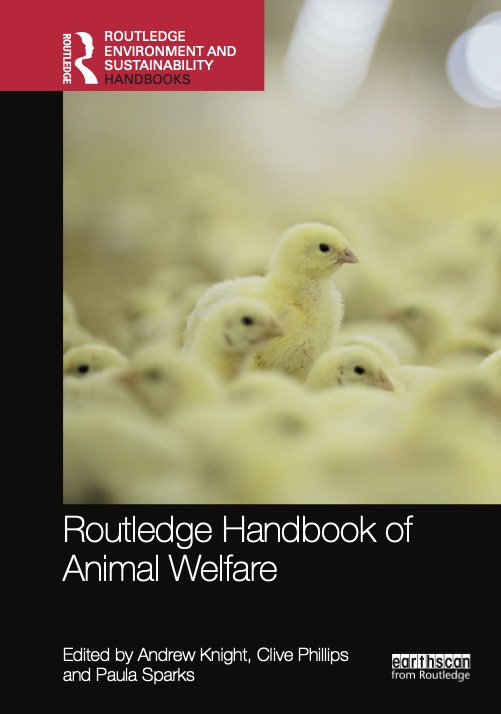The Routledge Handbook of Animal Welfare
An essential reference for animal welfare advocates

Concern for animals underpinned by science
Informed by recent advances in animal behavioural and cognitive sciences, new understanding of the remarkable abilities of a wide range of animals is leading to a fundamental reconsideration of the ways in which we use, and sometimes exploit, other species. Combining the expertise of 50 authors – many of whom are world leaders in their fields, the Routledge Handbook of Animal Welfare comprehensively covers animal welfare concerns associated with the farming of terrestrial species and fish, transportation, slaughter, the use of animals in laboratories, zoos, entertainment settings, and as companions, working animals, and more. Virtually all contemporary animal welfare issues are covered in depth.
Many of these are controversial, challenging accepted practices, and throwing into sharp relief the differing interests of stakeholders such as industry, government, wider society, and of course, the animals themselves. In such a socially contested domain, sound evidence is important. This book explores the scientific underpinnings for the moral consideration of animals – and of evolving conceptualisations of animal welfare, that give rise to concerns about the welfare of animals used in a wide variety of settings.
The inclusion of recent topics such as the impacts of climate change on animal welfare, and the links between animal exploitation, antimicrobial resistance and pandemics, ensure this text is among the most current in its field. This textbook also includes coverage of animal ethics, animal law in key regions of the world, stakeholder perspectives, education, communication and human behavioural change. It is essential reading for policy-makers, researchers and other professionals working in the animal welfare sector, and for students of animal welfare everywhere.
Contents Include:
Orders, sample text and more:
PART 1 – animal welfare fundamentals
1. The moral status of animals: biological foundations
2. Animal welfare concepts
3. Animal welfare assessment
PART 2 – Animal farming, transportation and killing
4. Contemporary animal farming
5. Farming poultry
6. Farming pigs
7. Farming cattle
8. Farming sheep and goats
9. Farming nondomesticated and semidomesticated terrestrial species
10. Farming fish
11. Transportation
12. Slaughter, Euthanasia, and Depopulation
PART 3 – Animal use for other purposes
13. Scientific and educational animal use
14. Animals in entertainment
15. Zoos and aquaria
16. Hunting, fishing and whaling
17. Commercial fisheries
PART 4 – Species-specific concerns
18. Canines and felines
19. Equines
20. Non-domesticated terrestrial species
21. Companion fish
22. Marine mammals
PART 5 – Recent and emerging issues
23. Climate change, human-wildlife conflict and biodiversity loss
24. Animal welfare and human health
25. Animal disaster management
PART 6 – Animal ethics and law
26. Animal ethics
27. Animal law – historical, contemporary and international developments
28. Key animal law in Australia
29. Key animal law in China
30. Key animal law across Europe
31. Key animal law in India
32. Key animal law in South Africa
33. Key animal law in the United States
PART 7 – Social change for animals
34. Stakeholder groups and perspectives
35. Animal advocacy and human behavioural change
36. Animal Welfare Education and Communication
